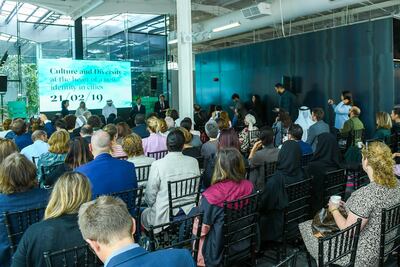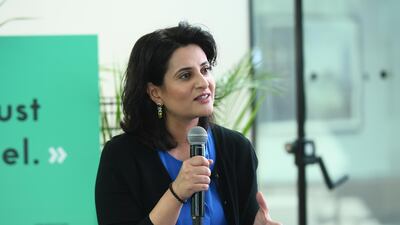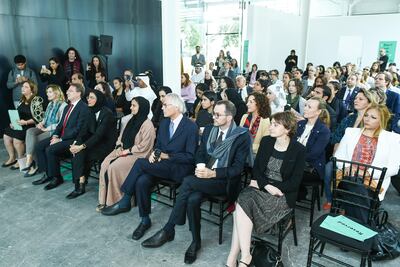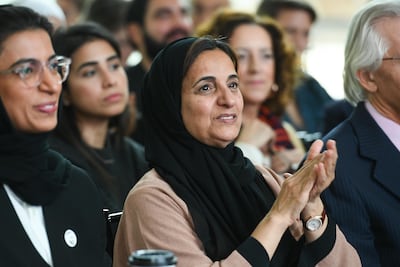Our cities need to be "loved and cared for" or societies run the risk of damaging their history, heritage and identity.
This was one of the key messages delivered at an Abu Dhabi event organised by Thinkers and Doers, a think-and-do tank. The gathering brought together a panel of distinguished commentators to discuss how culture has defined the history and will shape the future of cities.
It was the first in a series of talks under the title Conversations; further events are promised in April and October, and follows four years of similar and successful discussions in Paris. This talk, titled Culture and Diversity: At the Heart of a New Identity in Cities, and held at Abu Dhabi’s Warehouse421, was a co-production with the French Institute in the UAE, the French embassy’s cultural department.
Organisers said the purpose of the discussion was to gather together “those who want to commit” and to find solutions to the world’s most pressing problems. The conversation was conducted between Sheikha Hala bint Mohammed Al Khalifa, director general of the Culture and Arts Directorate in Bahrain; Vilma Jurkute, director of Alserkal Avenue in Dubai and Dr Khaled Alawadi, who is assistant professor of sustainable urbanism at Khalifa University Masdar campus in Abu Dhabi.
Sofiane Si Merabet, who has been described as a cultural cartographer, moderated the session. Convened as a breakfast club for a hundred or so invited guests and dignitaries, the discussion continued long into the morning. At its heart was a lively debate on urbanism, creative economies, history, nostalgia and diversity.
Sheikha Hala said that "cities need to be loved and cared for". Jurkute added that cities are engaged in a complex negotiation over development.
Citing the experience of Alserkal Avenue in Dubai, she said that societies and cities should always go back to the question of the meaning of arts and culture within the context of rapid urban development. She said we "need to slow down, because the pace of development of culture shouldn't be happening so fast". She also said that the cities of the Arabian Gulf states were uniquely placed to create their own future and paradigms: "We don't have to follow anyone else's model."
Alawadi described urbanism as a persistent cross-cultural dialogue. He said urban form has a huge impact on interaction and communication between people and called for a greater focus on everyday “people-generated” urbanism, which is a low-budget, organic way to shift design away from professional planners.
“Informality brings communities together”, he said, referencing how to counterbalance grand plans for cities in the past, imagined and realised by engineers and property developers, which too often imposed formal structures on urban environments, to the obvious detriment of neighbourhood informality and community. He then presented an intriguing vision of what that future might look like.
“Let’s think about it in downtown Abu Dhabi. What about, for example, shutting a street down to cars for a Saturday? People would go down the street and celebrate, exchange and enjoy. It would bring people together.”
Speaking after the event, Sheikha Hala said that cultural dialogues, such as the Thinkers and Doers series, were vitally important.
She added that “culture belongs to everyone, art belongs to everyone and it’s important to reach out to people in our communities,” referencing Bahrain’s busy schedule of festivals and its cultural calendar.

“As our countries grow and develop, I think we are influenced by many elements, including history and heritage. Every building, every street has a story to tell. The more care we put into preserving our cities, the more sense of belonging we create within the community. I think the backbone of heritage is nostalgia and the sense of wanting that flavour to be still present with us in buildings, in exhibitions and elsewhere.”
Earlier, Si Merabet, the event’s moderator, had described nostalgia as “the new oil” of the region, saying that “instead of being stuck in the past, we can use it to write a new future”.
Returning to the themes of heritage and urban development, Sheikha Hala reiterated that “cities need to be loved” and to be cared for collectively by societies, entities and individuals.
“Sheikha Lubna ended with healing,” she said, in reference to the prominent Emirati politician who attended the event.
“I think both [healing and love] are equally important, because if cities are not loved, they won’t give back.”
For more information on the next event in the series, visit www.thinkers-doers.com




